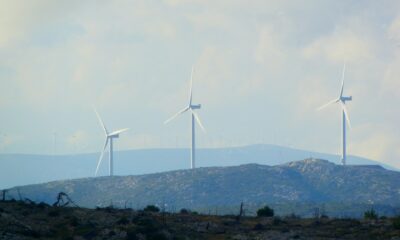Featured
ESG: The New Direction for the Spanish Tourism Sector
The Spanish tourism sector, which has become one of the sectors that contributes the most to the country’s economy, is seeking the implementation of sustainable development through the application of ESG criteria. That is because the identification, control, and measurement of ESG criteria within a company has direct repercussions on attracting new investors.

ESG (environmental, social, and governance) criteria have become a must for investors and a necessity for all companies seeking to develop a sustainable and efficient business model that will enable them to achieve the goals of the 2030 agenda.
Investor interest in environmental issues has been on the rise, both for the risk and the business opportunity. It is precisely this interest that makes ESG criteria so important, as they not only have a positive impact on society, the environment, and corporate governance but also ensure sustainable growth.
Precisely for these reasons, the tourism sector, which has become one of the sectors that contribute the most wealth to the Spanish economy, representing 14.6% of GDP (according to a report by the business association World Travel & Tourism Council (WTTC), is currently seeking to implement sustainable development through the application of ESG criteria. The identification, control, and measurement of ESG criteria within a company has a direct impact on attracting new investors, on its reputation, and, of course, on the sustainability of the business.
Read more about the Spanish tourism sector and find the most important business news of the day with the Born2Invest mobile app.
Companies that are committed to sustainable tourism differentiate themselves from others
In short, it can be said that ESG criteria, in addition to being functional for sustainability, allow the implementation of procedures that increase the efficiency of existing processes, maximizing the use of the company’s resources.
Undoubtedly, companies that are committed to sustainable tourism differentiate themselves from others, stand out from other competitors, and are better positioned in the eyes of their customers or consumers, raising the value of the company and being more appealing in the market, undoubtedly, it is a new differentiating character to which large companies have already set their course.
It should also be noted that the implementation of ESG criteria is not a business vision that is only being implemented by companies seeking financing, but that the new legal provisions, and especially those that will come in the immediate future, have made it a necessity. Thus, in Spain from 2021, by virtue of Directive 2014/95/EU on October 22nd, 2014, transposed by means of Royal Decree-Law 18/2017, of November 24, (which amended the Commercial Code, the Capital Companies Act (“LSC”) and the Accounts Auditing Act, in terms of non-financial information and diversity) companies in which at least two of the following three requirements are met: A) that the total asset items exceed €20 million, B) that the net amount of the annual turnover exceeds €40 million C) Have a number of employees exceeding 250; have the obligation to provide non-financial information, also known as the corporate sustainability report.
The European Union’s climate target to reduce EU emissions by at least 55%, allows for predicting that in a short period of time, Europe will approve new measures and obligations in the field of sustainability. Such as the requirement for environmental due diligence or the extension of the companies obliged to provide non-financial information, also known as corporate sustainability reporting.
In addition and no less important, the trend of consumption in the tourism sector should be highlighted, and that is that in recent years, consumers opt more often for those companies that offer their services betting on sustainability and the application of ESG criteria, thus serving as a kind of gauge of excellence in terms of service delivery, the carbon footprint is on the legal horizon, and EU citizens are beginning to become aware in this field.
__
(Featured image by chabotphoto via Pixabay)
DISCLAIMER: This article was written by a third party contributor and does not reflect the opinion of Born2Invest, its management, staff or its associates. Please review our disclaimer for more information.
This article may include forward-looking statements. These forward-looking statements generally are identified by the words “believe,” “project,” “estimate,” “become,” “plan,” “will,” and similar expressions. These forward-looking statements involve known and unknown risks as well as uncertainties, including those discussed in the following cautionary statements and elsewhere in this article and on this site. Although the Company may believe that its expectations are based on reasonable assumptions, the actual results that the Company may achieve may differ materially from any forward-looking statements, which reflect the opinions of the management of the Company only as of the date hereof. Additionally, please make sure to read these important disclosures.
First published in LegalToday, a third-party contributor translated and adapted the article from the original. In case of discrepancy, the original will prevail.
Although we made reasonable efforts to provide accurate translations, some parts may be incorrect. Born2Invest assumes no responsibility for errors, omissions or ambiguities in the translations provided on this website. Any person or entity relying on translated content does so at their own risk. Born2Invest is not responsible for losses caused by such reliance on the accuracy or reliability of translated information. If you wish to report an error or inaccuracy in the translation, we encourage you to contact us.

-

 Biotech4 days ago
Biotech4 days agoAdvancing Sarcoma Treatment: CAR-T Cell Therapy Offers Hope for Rare Tumors
-

 Impact Investing2 weeks ago
Impact Investing2 weeks agoShein Fined €40 Million in France for Misleading Discounts and False Environmental Claims
-

 Impact Investing1 day ago
Impact Investing1 day agoNidec Conversion Unveils 2025–2028 ESG Plan to Drive Sustainable Transformation
-

 Impact Investing1 week ago
Impact Investing1 week agoVernazza Autogru Secures €5M Green Loan to Drive Sustainable Innovation in Heavy Transport

























